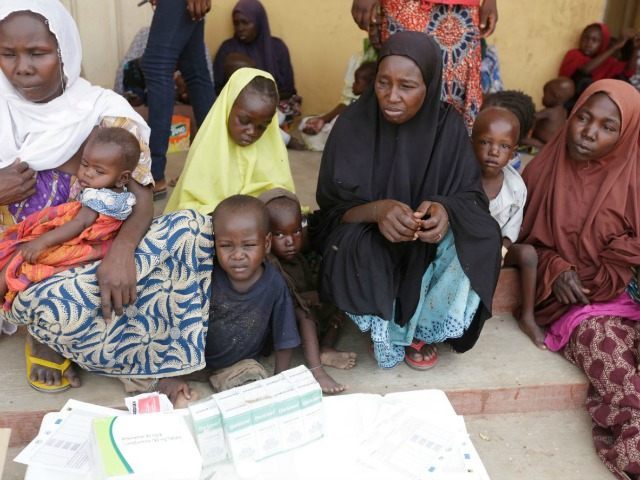Women and children freed from captivity under the jihadist terror group Boko Haram are being held at an undisclosed location by the Nigerian military after accusing each other of continuing to communicate with and work for the terrorist group. Nigerian officials claim they have been relocated to an undisclosed location for more focused therapy to help them work through their trauma.
The Associated Press reports that at least 275 women and children rescued from the Sambisa Forest in northern Nigeria have been forced to remain in the custody of the military, unable to attempt to return to their homes and without communication from the outside world. Nigerian military officials told the AP that distractions in the Yobe state camp, where they were previously held, had made mental counseling impossible and that they were now receiving “proper medical attention and psycho-social therapy.”
Nigeria’s Pulse reports that the women and children were relocated after clashes between them in which the women accused each other of working with Boko Haram and “suspicions arose that they were still communicating with the terrorists.” Witnesses claimed the group was driven to a local airport and moved to an undisclosed location. One witness, whose relative was among the group, reported that the women themselves did not appear to know “where they were being taken to because the soldiers didn’t make any explanation to the women.”
The transfer to a secret facility followed reports that the women were fighting among each other, with some accusing others of still working for Boko Haram. Some women claimed that the women among them who were better fed or abused less by the terrorists were treated better in exchange for their loyalty. Tensions rose to a fever pitch at a group counseling session where accusations flew between the women, according to witnesses speaking to the Associated Press. Many of the women had been married to Boko Haram terrorists while in captivity, triggering the distrust of others who claimed the women were loyal to their forced husbands.
One counselor, speaking to the AP, said there was little reason to believe that the women were, in fact, working with Boko Haram. The only person who had openly expressed admiration or support for the terrorist group, the counselor said, was “a 4-year-old boy” who “openly boasted that his father would slit people’s throats and gun them down.”
The military is nonetheless concerned that some of the women have been “radicalized” while in captivity, internalizing the Islamist propaganda of the group, the BBC reports. Nigerian officials told the outlet the women would be “housed at the military facility under the Countering Violent Extremism (CVE) Programme,” a special program for those brainwashed into radical Islam.
The transfer of former captives occurs as the Nigerian government takes nearly 600 soldiers to trial for various crimes committed during the fight against Boko Haram. The charges include fleeing the battlefield during exchanges with Boko Haram and assorted acts described as treason. Boko Haram enjoyed broad successes, including the abduction of hundreds if not thousands of women from ransacked towns, during exchanges in which Nigerian soldiers lost many battles or left key regions of the country unprotected.
While the military has made significant advances in defeating the group—which is now allied officially to the Islamic State and has rebranded as the Islamic State West Africa Province (ISWAP)—leadership has been elusive to the military. Reports that Boko Haram leader Abubakar Shekau has been killed or captured resurface with little evidence every few months; this week, “unconfirmed reports” claim Shekau “(or his impostor)” is in military custody.

COMMENTS
Please let us know if you're having issues with commenting.